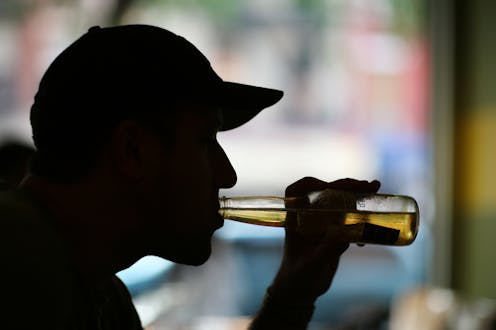why 9 experts think proposed NT alcohol reforms would be a disaster
- Written by Cassandra Wright, Alcohol and other Drugs Program Lead, Menzies School of Health Research

The new Northern Territory government is planning a swathe of changes to alcohol policy.
If implemented, these changes fly in the face of what evidence shows works to reduce alcohol-related harms. Some are also out of step with the rest of Australia.
Among our concerns are plans that would lead to harmful alcohol products becoming cheaper, alcohol becoming more easily available, criminalising public drunkenness, and a particularly worrying type of mandatory alcohol treatment – all of which evidence suggests will cause more harms.
No one is downplaying the magnitude and complexities of alcohol-related issues in the NT. But we hope the territory government will pay more heed to the evidence and voices of those most impacted.
Alcohol-related harm in the NT is complex
Alcohol-related harms in the NT are significantly higher (for both Aboriginal and non-Aboriginal people) than elsewhere in Australia.
In the territory, these harms contribute to health and social outcomes costing at least A$1.4 billion a year. Alcohol harms result in costs related to health care, deaths, crime, policing and child protection.
Aboriginal communities in the NT have for decades cried out for solutions and services that effectively respond to alcohol-related harm. Instead, they found their lives made part of a political football match on law and order. Policies have been reactive and mostly ineffective. They’ve been overturned at each election.
Now, the new NT government is discussing changes that promise to exacerbate the very issues it aims to address.
1. Cheap alcohol that contributes most harm would be on the market
The World Health Organization recognises that raising the price of alcohol is one of the most effective ways for governments to reduce alcohol-related harm.
So some governments around the world, including in the NT, have set a price below which alcohol cannot be sold, known as the minimum or “floor price”. This targets cheap, high-strength alcohol associated with patterns of drinking that cause the most harm.
The new NT government plans to repeal this, despite evidence showing this works to reduce harms.
Since the NT alcohol floor price was set at $1.30 per standard drink in 2018, there has been a:
14% reduction in alcohol-related assaults in Darwin and Palmerston
11% reduction in domestic and family violence assaults
21% reduction in domestic and family violence assaults involving alcohol
19% reduction in alcohol-related emergency department attendances.
Originally, experts recommended a $1.50 floor price but this was reduced to $1.30 after a backlash from alcohol industry lobbyists. Had the policy not been watered down, evidence suggests the impacts above would likely have been greater.
The floor price has likely also lost some of its initial impact as it has never been indexed for inflation.
The best available research shows the floor price has reduced alcohol-related harms with no evidence of unintended consequences or negative impacts on the alcohol industry, despite claims otherwise.
Researchers and experts from around the world have been writing to NT ministers urging them to reconsider repealing this effective policy.
This includes researchers from the United Kingdom and Canada, who have coauthored this article. In these countries, evidence on the effectiveness of minimum pricing has been used to increase the floor price by 30%, not abolish it.
2. Bottle shops could be open longer
There are also proposals to repeal current restrictions on bottle shop trading hours. Such restrictions are highly effective in reducing alcohol harms, including violence.
Our paper from earlier this year found that in the town of Tennant Creek, restrictions to reduce trading hours and introduce purchase limits at bottle shops resulted in a 92% reduction in alcohol-involved domestic and family violence assaults.
Preliminary analyses of the reduced trading hours introduced in Alice Springs following Prime Minister Anthony Albanese’s visit in early 2023 also suggest a clear reduction on violence rates.
3. New public drunkenness offence
Ministers were also set to pass laws to create a new offence for “nuisance” public intoxication (also known as public drunkenness). This would allow police officers to arrest people and fine them up to $925, in addition to current powers to seize and tip out alcohol from people drinking in prohibited areas.
This is at the time when nearly every other jurisdiction in Australia is in the process of decriminalising public drunkenness, making the NT out of step with the rest of the nation.
The NT’s proposed new laws on public drunkenness would criminalise more people who are already locked out from our society, placing them at risk of the negative, intergenerational and preventable impacts that often arise from contact with the justice system.
4. Mandatory rehab
Mandatory alcohol treatment was also an election commitment.
In its previous term of government, mandatory alcohol treatment was focused on people with a public intoxication offence rather than providing quality care to people with alcohol dependence in life-saving circumstances. If the same model is reintroduced, this is potentially harmful and at best ineffective.
In the NT, this model of mandatory alcohol treatment had no better outcomes than for those who may not have received any treatment at all. But it cost the taxpayer three times as much.
Where to from here?
Researchers, health professionals and partner organisations have urged the NT government to reconsider these decisions, as we have well-founded concerns these may worsen the very issues the government aims to address.
There’s no need to guess the outcomes of changing, repealing or introducing alcohol policies. We can draw on robust evidence, including extensive research from the NT, on what works in our communities.
Authors: Cassandra Wright, Alcohol and other Drugs Program Lead, Menzies School of Health Research





